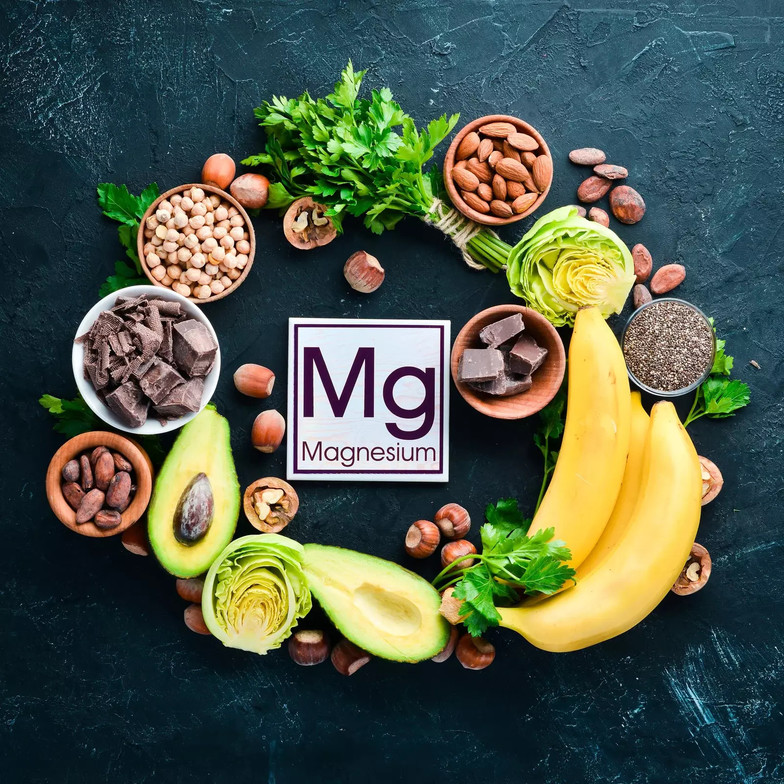
Magnesium: The Underrated Mineral for Muscle and Nerve Health
When we think about nutrients essential for optimal health, magnesium is rarely the first that comes to mind. But this quiet mineral plays a crucial role in over 300 enzymatic reactions in the body, many of which directly influence muscle function, nerve conduction, energy production, and recovery.
Despite its importance, magnesium deficiency is prevalent, especially among active individuals, those under chronic stress, and people who consume a modern Western diet.
In this post, we'll explore what magnesium does in the body, how deficiency can show up, and how optimizing your magnesium status can support muscle performance, recovery, and nervous system resilience.
What Is Magnesium and Why Is It Important?
Magnesium is an essential macromineral, meaning your body requires it in relatively large amounts. It plays a crucial role in various functions that are essential for health and performance.
Core functions of magnesium include:
- Regulating muscle contraction and relaxation
- Supporting nerve transmission and brain function
- Facilitating energy (ATP) production
- Aiding protein synthesis and DNA repair
- Balancing electrolyte levels
- Modulating inflammation and oxidative stress
Magnesium plays a crucial role in muscle movement, nerve function, and the body's recovery from stress and physical activity.
Magnesium and Muscle Health
1 Muscle Contraction and Relaxation.
Magnesium serves as a natural calcium blocker. While calcium promotes muscle contraction, magnesium is essential for muscle relaxation. Insufficient magnesium levels can cause muscles to remain partially contracted, resulting in:
- Cramping
- Tightness
- Twitching
- Delayed recovery
2. Exercise Recovery
Magnesium helps clear lactic acid from muscles, reduces oxidative stress, and supports muscle protein synthesis. Adequate levels may minimize post-exercise soreness and improve muscular endurance.
3. Preventing Muscle Cramps
Magnesium is commonly used to prevent or reduce nighttime leg cramps, exercise-induced spasms, and tension in overused muscle groups, especially in athletes and active individuals.
Magnesium and Nerve Health
1. Calming the Nervous System
Magnesium plays a crucial role in maintaining nervous system balance by regulating neurotransmitters, such as GABA, which promotes relaxation and stress reduction.
Low magnesium levels are associated with:
- Anxiety
- Irritability
- Difficulty sleeping
- Heightened pain sensitivity
2. Nerve Conduction and Muscle Control
Magnesium helps regulate the electrical impulses that travel through nerves and into muscles. Without adequate magnesium, nerves can become hyperexcitable, leading to overstimulation, tremors, or spasms.
Signs and Symptoms of Magnesium Deficiency
Because magnesium is used throughout the body, deficiency can cause widespread, seemingly unrelated symptoms.
Common signs include:
- Muscle cramps or spasms
- Eye twitches or muscle fasciculations
- Fatigue or low energy
- Restlessness or poor sleep
- Tension headaches or migraines
- Numbness or tingling
- Constipation
- Increased anxiety or irritability
- Irregular heartbeat or palpitations
Magnesium deficiency is common in:
- People with high stress levels
- Athletes (especially endurance sports)
- Those with GI issues (e.g., IBS, Crohn's, Celiac)
- People with diabetes or insulin resistance
- Individuals taking certain medications (PPIs, diuretics, some antibiotics)
- Those consuming diets high in processed foods and low in leafy greens, nuts, and legumes
Testing Magnesium Levels: What You Should Know
Most doctors order serum magnesium, but this only reflects ~1% of your total body magnesium, which is primarily stored in bones and muscle tissue.
If you suspect a deficiency, more accurate assessments include:
- RBC (red blood cell) magnesium
- Magnesium loading tests
- Clinical evaluation of symptoms + dietary intake
At Arthrology Chiropractic, we can help you interpret your lab results or recommend testing through functional lab providers if needed.
Best Dietary Sources of Magnesium
Whole, unprocessed plant foods are generally the richest in magnesium. Top sources include:
- Leafy greens (spinach, chard, kale)
- Pumpkin seeds and sunflower seeds
- Almonds, cashews, and Brazil nuts
- Avocados
- Legumes (black beans, chickpeas, lentils)
- Dark chocolate (85% cacao or higher)
- Whole grains (quinoa, oats, brown rice)
- Bananas and figs
The magnesium content in food significantly depends on soil quality, which has deteriorated in recent decades, making supplementation essential for many individuals.
Magnesium Supplements: What to Know
Supplementation can be safe and effective when used appropriately, but form matters.
Most common and effective forms:
- Magnesium glycinate – calming; great for sleep, anxiety, and muscle tension
- Magnesium citrate – helpful for constipation or sluggish digestion
- Magnesium malate – may support energy production and chronic pain
- Magnesium threonate – crosses the blood-brain barrier, may support cognitive health
- Magnesium chloride or sulfate (Epsom salt baths) – absorbed through the skin; great for local muscle relaxation
Forms to avoid (less bioavailable or cause GI distress):
- Magnesium oxide (poorly absorbed)
- Magnesium carbonate (can cause bloating)
Dosage: Most adults benefit from 200–400 mg of elemental magnesium per day from supplements, but individual needs vary. Always start at a low dose and adjust gradually to minimize gastrointestinal side effects.
Can You Get Too Much Magnesium?
Magnesium from food sources is very safe. With supplements, excess intake can lead to:
- Diarrhea
- Nausea
- Abdominal discomfort
- Very high doses (in the thousands of mg/day) can lead to more serious issues in people with kidney dysfunction
Always consult with a provider before starting magnesium supplements, especially if you take medications or have health conditions.
Magnesium and Chiropractic Care
At Arthrology Chiropractic, we view your musculoskeletal and nervous systems as deeply connected, and magnesium supports both.
In patients experiencing issues such as:
- Muscle tension
- Poor recovery
- Chronic stress
- Tension headaches
- Insomnia
- Nervous system hypersensitivity
We often assess their magnesium levels as part of a comprehensive treatment plan. This plan may include nutritional guidance, supplementation, and manual therapies designed to restore movement and balance the nervous system.
Final Thoughts
Magnesium may not receive as much attention as vitamin D or omega-3 fatty acids. Still, its role in muscle recovery, nerve regulation, stress resilience, and sleep makes it one of the most impactful micronutrients for whole-body health.
Supporting your magnesium status offers significant benefits for athletes, high-performing professionals, and individuals recovering from pain or injury.
If you're curious about whether magnesium could help your recovery, tension, or performance, we're here to help you navigate the best options for your body and goals.

Edward Boudreau
Contact Me



.png)
